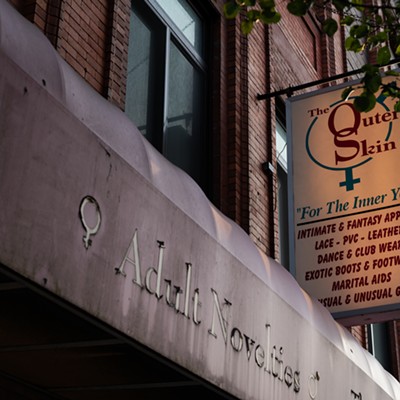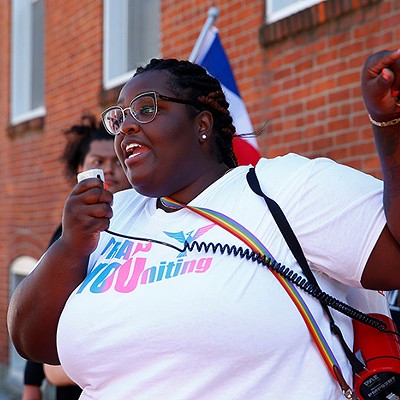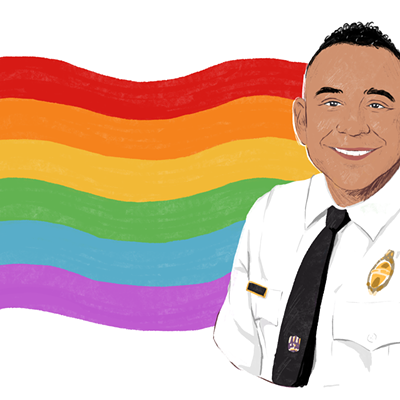Post-Gazette editorial says misgendering is free speech, but ignores that it increases suicidal thoughts among transgender people
After news broke that Trump wanted to define trans people out of federal policies, calls to a trans suicide hotline increased 400 percent.
In a Dec. 15 editorial, the Pittsburgh Post-Gazette editorial board weighed in on Twitter’s new policy banning misgendering or “dead-naming” transgender people on its platform. Dead-naming is when people intentionally refer to trans people by their pre-transition name, something right-wing Southwestern Pennsylvania politicians are known to do.
The editorial board recognized Twitter’s right as a private company to issue speech policies as it sees fit, but disagreed with Twitter’s inclusion of misgendering in its Hateful Conduct Policy. The board said that misgendering may be “controversial speech, or even insensitive speech,” but “not hate speech.”
The board suggested Twitter overreached and should have erred “on the side of free speech and free expression.”
But what the board didn’t mention was the data showing misgendering and other anti-trans rhetoric can have significant negative effects on transgender people.
For example, after an October memo leaked from the Trump administration that would seek to define gender solely as male or female for federal policies, the national grassroots organization Trans LifeLine reported a 400 percent increase in calls to its suicide hotline.
A 2018 study published in the American Academy of Pediatrics shows that transgender and nonbinary teens have attempted suicide at three times the rates of their cisgender peers.
Maria Montano, a labor activist who is transgender, is critical of the P-G’s editorial.
“I don’t think we should have to debate the fact that we exist,” says Montano.
The editorial board, which likely consists of publisher John Robinson Block and Editorial Director Keith Burris, ignores the mainstream medical community in its characterization of transgender identities.
“Every major medical association agrees that trans identities exists,” says Montano. “It’s like they want to talk about science, but they are not listening to the leading scientists.”
She believes editorials like this will just feed the hate that is already directed at trans people in Pittsburgh. She believes an editorial about the state of transgender rights in Pennsylvania, where it’s still legal to fire or evict transgender people, would be more welcomed. A 2015 study showed that 21 percent of trans Pennsylvanians experienced some form of housing discrimination because of being transgender.
“I don’t think they understand the power of their voices,” says Montano of the editorial board. “It is still a tough time to be a trans person, we have come a long way, but we are not there yet. And so to have the paper of record come out with this editorial ... You see ‘stronger than hate’ signs everywhere. But where are we on this issue?”
Last week, a transgender man said he was jumped and beaten by seven people at a Downtown 7-11 convenience story. According to WTAE, the man claimed he was called derogatory words during the incident and attacked because he is transgender.
Montano is afraid the P-G’s editorial will only encourage more anti-trans attacks. According to the national LGBTQ group the Human Rights Campaign, 2017 saw 29 fatal attacks against trans people and was the deadliest year in history. 2018 has seen a reduction, but still saw 22 fatal attacks of people because they were trans.
“I think it emboldens the behavior of folks that wish us harm,” says Montano. “It empowers folks who wish to deny our existence.”
The editorial board recognized Twitter’s right as a private company to issue speech policies as it sees fit, but disagreed with Twitter’s inclusion of misgendering in its Hateful Conduct Policy. The board said that misgendering may be “controversial speech, or even insensitive speech,” but “not hate speech.”
The board suggested Twitter overreached and should have erred “on the side of free speech and free expression.”
But what the board didn’t mention was the data showing misgendering and other anti-trans rhetoric can have significant negative effects on transgender people.
For example, after an October memo leaked from the Trump administration that would seek to define gender solely as male or female for federal policies, the national grassroots organization Trans LifeLine reported a 400 percent increase in calls to its suicide hotline.
A 2018 study published in the American Academy of Pediatrics shows that transgender and nonbinary teens have attempted suicide at three times the rates of their cisgender peers.
Maria Montano, a labor activist who is transgender, is critical of the P-G’s editorial.
“I don’t think we should have to debate the fact that we exist,” says Montano.
The editorial board, which likely consists of publisher John Robinson Block and Editorial Director Keith Burris, ignores the mainstream medical community in its characterization of transgender identities.
“Every major medical association agrees that trans identities exists,” says Montano. “It’s like they want to talk about science, but they are not listening to the leading scientists.”
She believes editorials like this will just feed the hate that is already directed at trans people in Pittsburgh. She believes an editorial about the state of transgender rights in Pennsylvania, where it’s still legal to fire or evict transgender people, would be more welcomed. A 2015 study showed that 21 percent of trans Pennsylvanians experienced some form of housing discrimination because of being transgender.
“I don’t think they understand the power of their voices,” says Montano of the editorial board. “It is still a tough time to be a trans person, we have come a long way, but we are not there yet. And so to have the paper of record come out with this editorial ... You see ‘stronger than hate’ signs everywhere. But where are we on this issue?”
Last week, a transgender man said he was jumped and beaten by seven people at a Downtown 7-11 convenience story. According to WTAE, the man claimed he was called derogatory words during the incident and attacked because he is transgender.
Montano is afraid the P-G’s editorial will only encourage more anti-trans attacks. According to the national LGBTQ group the Human Rights Campaign, 2017 saw 29 fatal attacks against trans people and was the deadliest year in history. 2018 has seen a reduction, but still saw 22 fatal attacks of people because they were trans.
“I think it emboldens the behavior of folks that wish us harm,” says Montano. “It empowers folks who wish to deny our existence.”



















